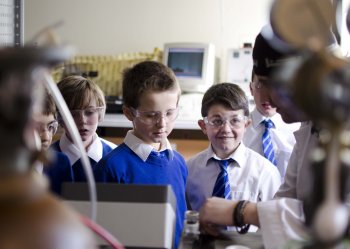
Pupils from Glencraig Integrated Primary School found out how modern science is helping save lives around the world when they visited the University of Ulster’s Engineering Research Institute at Jordanstown.
As part of a “Two Worlds” project funded by the Royal Society, the 37 pupils from the Holywood school took part in a series of practical microbiology experiments investigating the efficiency of water purification, sanitation and hygiene practices in developed and developing countries.
They were also introduced to the Clean Technology research ongoing at NIBEC focusing on water disinfection via solar disinfection (SODIS), which could have a dramatic impact on the quality of life of people in developing countries. This topic is especially relevant to Glencraig, as the school has links with a primary school in Uganda, where water quality can be a serious health issue.
Hosting the visit was leading Ulster research scientist Dr Patrick Dunlop.
“Due to the reduction of science in the NI Primary School curriculum, the “Two Worlds” project was funded to stimulate pupil’s interest in science, technology, engineering and maths (STEM) and demonstrate the relevance and impact that STEM has on our society, and could have in developing countries,” he said.
During the visit to NIBEC pupils took park in a series of activities showcasing NIBEC’s research research strengths in
sensors, devices and connected health;
microscopy of the surface of spiders and flies;
water powered rockets;
cell biology and regenerative medicine and
plasma science and technology.
Dr Dunlop said: “We are very grateful to the Royal Society for giving us the opportunity to run the Two Worlds project. It’s been a really enjoyable initiative, mainly due to the enthusiasm of the pupils towards the practical activities, although I was asked to answer a few random science questions that really stretched my knowledge! The project has also given me the opportunity to highlight the importance and impact of our solar disinfection research”.
Glencraig Principal Mr Jon Beattie said “The pupils had a great time working with Dr Dunlop using his expertise to help explore the health and hygiene challenges of water purification and sanitation here and in Africa. My class really enjoyed the hands on approach to learning through the range of valuable practical investigations which Dr Dunlop ran.
"They were also thrilled to be able to use scientific apparatus and equipment such as petri dishes, pipettes and filtration systems which primary aged children would not normally have access to. It has also been particularly noticeable how the project has helped my class foster really positive attitudes to science.”